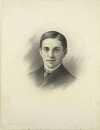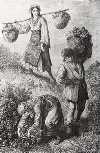
Source: The Free Dictionary

Source: The Free Dictionary
 While serving as consulting physician to Louis XV at Versailles, Quesnay developed an interest in economics. In his 1758 Tableau économique, he described the relationship between the different economic classes of society and the flow of payments among them, and he developed the concept of economic balance used by many later economic analysts. An advocate of laissez-faire economics, he believed that all wealth originated with the land. What school of economics is he credited with founding? Discuss
While serving as consulting physician to Louis XV at Versailles, Quesnay developed an interest in economics. In his 1758 Tableau économique, he described the relationship between the different economic classes of society and the flow of payments among them, and he developed the concept of economic balance used by many later economic analysts. An advocate of laissez-faire economics, he believed that all wealth originated with the land. What school of economics is he credited with founding? Discuss
Source: The Free Dictionary
 Islamic banking is a system of banking that is consistent with Islamic Sharia law. In particular, it prohibits usury—the collection and payment of interest—and investment in businesses considered unlawful. In the late 20th century, a number of Islamic banks were created to cater to the needs of the Muslim banking market. These institutions rely on the common Islamic concepts of profit sharing, safekeeping, joint venture, and leasing. How are these banks able to operate without charging interest? Discuss
Islamic banking is a system of banking that is consistent with Islamic Sharia law. In particular, it prohibits usury—the collection and payment of interest—and investment in businesses considered unlawful. In the late 20th century, a number of Islamic banks were created to cater to the needs of the Muslim banking market. These institutions rely on the common Islamic concepts of profit sharing, safekeeping, joint venture, and leasing. How are these banks able to operate without charging interest? Discuss
Source: The Free Dictionary
Definition: (adjective) Expressing extreme contempt.
Synonyms: contemptuous, insulting, scornful.
Usage: She cast one disdainful look at Moody, without troubling herself to express her contempt in words.
Discuss
Source: The Free Dictionary
At least a dozen dogs in Florida are sick with “dog flu,” but what exactly is this disease and where did it come from? So far, 12 dogs in Florida have tested positive for a strain of dog flu virus known as H3N2, and many other dogs in central and north … Discuss
Source: The Free Dictionary
 “Casey at the Bat” was one of the most popular poems in late 19th-century America. Recited in vaudeville performances and later taken up by many celebrities, the poem tells the story of an overconfident baseball player—the “mighty Casey”—who strikes out while trying to show off. Ernest Thayer, who wrote the poem, avoided acknowledging authorship for many years because he thought it was embarrassingly bad. Which two real-life towns have laid claim to being the Mudville mentioned in the poem? Discuss
“Casey at the Bat” was one of the most popular poems in late 19th-century America. Recited in vaudeville performances and later taken up by many celebrities, the poem tells the story of an overconfident baseball player—the “mighty Casey”—who strikes out while trying to show off. Ernest Thayer, who wrote the poem, avoided acknowledging authorship for many years because he thought it was embarrassingly bad. Which two real-life towns have laid claim to being the Mudville mentioned in the poem? Discuss
Source: The Free Dictionary
 Bulgaria supplies 90 percent of the world’s rose attar, and roses are raised for food and medicinal purposes as well. The 10-day festival that celebrates Bulgaria’s cultivation and export of roses is held in Kazanlak, a small town in what is known as the Valley of the Roses. It begins with a procession of farmers and young people dressed in native costume and carrying baskets for the ritual picking of the rose petals. Rose-decorated floats, costumed paraders, and folk dancers follow a route through all the nearby towns. Folk dance and song programs complete the festival activities. Discuss
Bulgaria supplies 90 percent of the world’s rose attar, and roses are raised for food and medicinal purposes as well. The 10-day festival that celebrates Bulgaria’s cultivation and export of roses is held in Kazanlak, a small town in what is known as the Valley of the Roses. It begins with a procession of farmers and young people dressed in native costume and carrying baskets for the ritual picking of the rose petals. Rose-decorated floats, costumed paraders, and folk dancers follow a route through all the nearby towns. Folk dance and song programs complete the festival activities. Discuss
Source: The Free Dictionary
%2c_oil_on_canvas%2c_66_x_81_cm%2c_Mus%c3%a9e_d'Art_Moderne_de_la_Ville_de_Paris...jpg) Dufy was a French designer and painter best known for his outdoor scenes of gaiety and leisure, like horse races, parades, and concerts. He also designed textiles and illustrated books. Dufy studied at the École des Beaux-Arts in Paris and experimented with Impressionism and, later, Fauvism. In the early 1920s, he developed his distinctive style characterized by sketchily drawn objects on bright, decorative backgrounds. Later, he completed one of the largest modern paintings, an ode to what? Discuss
Dufy was a French designer and painter best known for his outdoor scenes of gaiety and leisure, like horse races, parades, and concerts. He also designed textiles and illustrated books. Dufy studied at the École des Beaux-Arts in Paris and experimented with Impressionism and, later, Fauvism. In the early 1920s, he developed his distinctive style characterized by sketchily drawn objects on bright, decorative backgrounds. Later, he completed one of the largest modern paintings, an ode to what? Discuss
Source: The Free Dictionary
 Throughout history, myriad unfortunate individuals have suffered unusual deaths in all manner of bizarre circumstances. In 458 BCE, Greek playwright Aeschylus was allegedly killed when an eagle dropped a tortoise on his head. In 1771, Swedish King Adolf Frederick reportedly “ate himself to death.” Distinguished as the only jockey to posthumously win a race, Frank Hayes died astride his horse before being carried over the finish line in 1923. What are some other bizarre deaths? Discuss
Throughout history, myriad unfortunate individuals have suffered unusual deaths in all manner of bizarre circumstances. In 458 BCE, Greek playwright Aeschylus was allegedly killed when an eagle dropped a tortoise on his head. In 1771, Swedish King Adolf Frederick reportedly “ate himself to death.” Distinguished as the only jockey to posthumously win a race, Frank Hayes died astride his horse before being carried over the finish line in 1923. What are some other bizarre deaths? Discuss
Source: The Free Dictionary
Definition: (adjective) Seen by the eye.
Synonyms: visual.
Usage: The evidence that the house is haunted is of two kinds: the testimony of disinterested witnesses who have had ocular proof, and that of the house itself.
Discuss
Source: The Free Dictionary